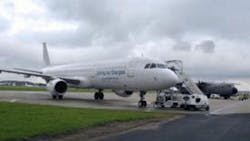Biofueled Airbus Debuts at Paris Air Show
LE BOURGET -- An Airbus airliner flew from southern France to the Paris Air Show on Thursday with one fuel tank partially filled with farnesane, a biofuel made from sugar cane as the industry experiments with green technology.
The gambit was to show that the fast-growing air transport sector is eager for clean fuels, but the ability for green fuels to compete with petroleum-based kerosene that spews tons of CO2 and other pollutants into the atmosphere remains way off.
The sugar fuel was developed by Amyris, a U.S. company owned by the French oil major Total, and could be on the market starting next year. Other key partners in the demonstration were Air France and Safran, which built the engine used in the test.
"Technically there are solutions, but economically it has not taken off, that is for sure," said Pierre Porot, a biofuel specialist at the French institute IFP Energies Nouvelles.
Parked on the Le Bourget airport tarmac, the A321 looked quite similar to more conventional passenger planes and attracted hardly as much attention as the sleek combat jets sitting nearby.
It was only the second time a plane has flown with this kind of fuel, the first being in Brazil, where Total produces farnesane.
The flight, which lasts about an hour when commercial planes make it, used 10% farnesane, consuming about four tons of sugar cane.
But developers said use of sugar for fuel would not affect food markets, a usual complaint against biofuel technology. "Sugar cane is not considered a food product by the (UN) Food and Agriculture Organization, it does not compete therefore with food sources," said Philippe Marchand, head of Total's biofuel unit.
Issue of Cost
For now however the main issue is cost. Experts estimated that existing "biokerosenes" cost between 30% and 50% more than the normal fuel.
So while airlines like Lufthansa and KLM have begun to incorporate biofuels in their operations, and a flight using only biofuel took place in Canada late last year, no carriers use it in significant quantities.
"Test flights are easy because they need only a few thousand liters of fuel," noted Claire Curry, an analyst at Bloomberg New Energy Finance (BNEF).
"But to obtain large quantities you have to build refineries costing $200-300 million and the problem is finding the money," she said.
Total's Marchand is not deterred however, and once the new fuel has been certified, he intends to expand production facilities to Europe.
"French beet farmers are very interested in diversifying their activities because of the weakness in the ethanol market," he said.
Philippe Boisseau, head of Total's New Energies division said: "In four to five years, the goal is to make the fuel with non-edible parts of plants. To transform cellulose into non-food sugars that are then turned into biojet" fuels.
Other possible end products include biodiesel, cosmetics, medicines and even perfumes.
The cost issue could reverse meanwhile, because standard kerosene prices and carbon taxes will likely climb higher, forcing airlines to come up with alternatives.
Major aircraft manufacturers such as Airbus, Boeing and Embraer have said they are mulling joint programs to develop biokerosene, since their futures also depend on a sustained source of jet fuels.
Environmental groups are bringing pressure to the air industry too. On Thursday, the French activist group Reseau Action Climat denounced the pollution generated by constantly growing traffic.
"Flying is the most polluting means of transport. Measured by passenger and by kilometer travelled, it is three times worse for the climate than cars," the group said.
Total hopes to have its farnesane fuel certified by the end of the year, and possibly have planes flying with sugar-based fuel in 2014.
- Sandra Laffont and Marc Preel, AFP
Copyright Agence France-Presse, 2013
About the Author
Agence France-Presse
Copyright Agence France-Presse, 2002-2025. AFP text, photos, graphics and logos shall not be reproduced, published, broadcast, rewritten for broadcast or publication or redistributed directly or indirectly in any medium. AFP shall not be held liable for any delays, inaccuracies, errors or omissions in any AFP content, or for any actions taken in consequence.
